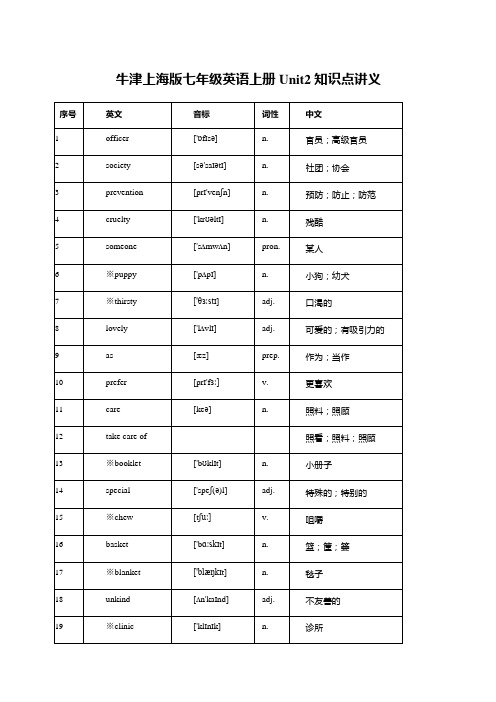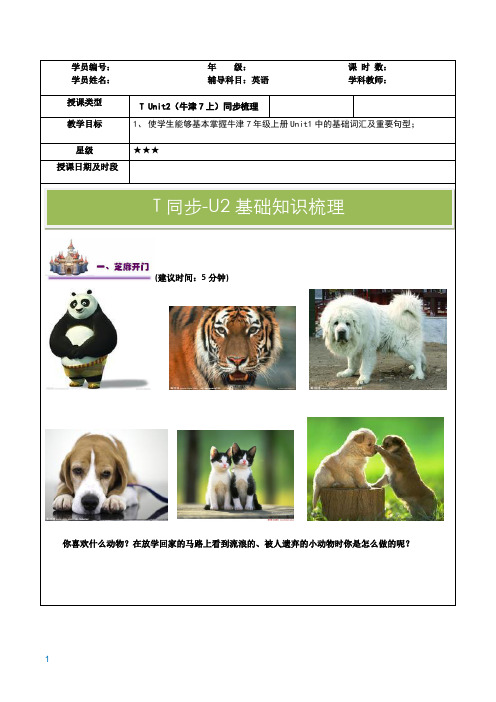七年级英语上册满分冲刺第2讲听力之短对话讲义新版牛津版
- 格式:doc
- 大小:83.00 KB
- 文档页数:6

牛津译林版七年级英语上册Unit2知识点讲解汇总Knowledge Point 1: Let-type Imperative Sentences (P18)1) "Let's celebrate!" XXX "let"。
The imperative sentence is one of the basic sentence patterns in English。
which is often used to express the speaker's ns。
requests。
commands。
etc。
Its sentence structure is "let + personal pronoun (object form) + base form of the verb"。
that is。
"let + sb + do + sth".eg: Let's go and see our English XXX.Let me help you find it.Note: "let's" and "let us" are slightly different。
The structure of "let's + base form of the verb" indicates that the imperative object includes both the speaker and the listener。
while the structure of "let us + base form of the verb" indicates that the speaker requests n to do something (first person plural)。

七年级上册知识点复习讲义Unit2 Let’s play sports!一、教学目标:过讲解,学生能够理解Unit2所出现的生词、短语和句型。
2.通过操练,学生能够巩固并掌握Unit2所出现的要点内容。
二、教学内容:七上Unit2知识点复习三、教学重难点:知识点的分析及掌握技巧四、教学程序:(一)、检查并订正上次布置的作业;(二)、解答学生在英语学习中的有关问题;(三)、教学内容:七上Unit2知识点复习与练习重点单词:1.like2. walk3. player4. also5. enjoy6. hope7. else易考点解析:1. likelike是及物动词,意为“喜欢,喜爱”。
后面可以跟名词或者代词作宾语,也可以跟动词不定式(to do)或者动名词(doing)作宾语。
跟“to do”作宾语时,表示某一次的行为倾向,跟“doing”作宾语时表示一种习惯或者爱好。
例如:I like English. 我喜欢英语。
(名词作宾语)Usually I like doing my homework after supper, but today I like to watch TV.我通常喜欢晚饭后做作业,但是今天我想看电视。
(动名词和动词不定式作宾语)拓展:like还可以作名词,表示“爱好,喜好”,常用于复数形式,它的反义词是dislike。
例如:Please tell me your likes and dislikes. 请告诉我你的好恶。
2. walkwalk作动词,意为“走,步行”,可与on foot进行同义转换。
例如:He walks to work every day. = He goes to work on foot every day. 他每天步行去上班。
拓展:walk还可作可数名词,意为“走,步行”,尤指为娱乐或运动所作的“散步”,常构成短语:take/have a walk 散步go for a walk去散步go out for a walk出去散步3. playerplayer是可数名词,意为“运动员”,它是由动词play + 后缀er构成的名词。

牛津上海版七年级英语上册Unit2知识点讲义知识点梳理I. Useful words and expressions1. I’m an SPCA officer.➢注意:SPCA中的“S”/es/的发音以元音开头,所以要用冠词an. 类似的字母发音以元音开头还有:F、H、L、M、N、S、X。
2. That’s right.➢注意区别:That’s right, That’s all right, All rightAll right=OK 好的;好吧That's all right意为“没关系,不客气”,用于Sorry或Thank you的回答。
That's right意为“那没错”, 表示某人的观点正确。
3. They had no food or water.➢no=not any 本句可改写为:They didn’t have any food or water.➢肯定句中连词应用and[e.g.] The students sang and danced in the park yesterday.否定句中连接并列成分应用or[e.g.]There isn’t any air or water on the moon.4. I found them and took them to the SPCA.➢take sb. / sth. to some place 把……带去(某地)bring sb. / sth. to some place 把……带来(某地)5. Would you like to keep one as your pet?➢Keep…as…:饲养…当作➢one(s) 用来代替前面出现过的单数(复数)的人或物;[e.g.] I’m looking for a cat. Do you see one?The books on this desk are newer than the ones on that desk.6. I prefer the black one.➢prefer最常见的意思是"比较喜欢"、"更喜欢"等, 可以构成以下结构:1) prefer sth/doing sth.. [e.g.] I prefer watching TV.2) prefer to do sth. [ e.g.] I prefer to go at once.3) prefer sth. /doing sth. to sth. / doing sth. = like…better than…[e.g.] I prefer coffee to tea.Mr. Wang preferred reading to doing nothing.7. How to take care of your new puppy?➢take care of + n. /pron.(代词用宾格)➢take care of = look after =care for➢好好照顾,悉心照顾take good care of = look after well8. Feed him/her 1-2 times every day.➢every day 时间副词; 每天[e.g.] I leave home for school at 7 o’clock every day.everyday = daily形容词;每天的,日常的。

学员编号:年级:课时数:学员姓名:辅导科目:英语学科教师:授课类型T Unit2(牛津7上)同步梳理教学目标1、使学生能够基本掌握牛津7年级上册Unit1中的基础词汇及重要句型;星级★★★授课日期及时段T同步-U2基础知识梳理(建议时间:5分钟)你喜欢什么动物?在放学回家的马路上看到流浪的、被人遗弃的小动物时你是怎么做的呢?一、词汇Words (建议20分钟,老师边讲边要求学员记住单词,此环节结束之后要求学员记住80%)1. officer n. 官员;高级官员【词性转换】office n. 办公室e.g. A police officer came to help when our car broke down on the way.我们的汽车在路上出了毛病,一位警官帮了我们的忙。
2. society n. 社团;协会【词性转换】social adj. 协会的;社会的e.g. the Chemical Society of China 中国化学学会3. prevention n. 预防;防止;防范【词性转换】prevent v. 预防;防止e.g. Prevention is better than cure. 预防胜于治疗。
批注:prevent和protect,很多孩子分辨不清楚,还应该让孩子注意protect的名词形式是protection。
4. cruelty n.残酷【词性转换】cruel adj. 残酷的;悲惨的e.g. cruelty to children 虐待儿童5.someone pron. 某人【近义词】somebody pron. 某人;有人e.g. Someone wants to talk with you. 有人想和你谈话。
6. puppy n. 小狗;幼犬【提示】dog一般用来指“成年狗”或表示狗的总称;puppy特指小狗,复数形式为puppies7. thirsty adj. 口渴的【词性转换】thirst n. 口渴e.g. I often feel thirsty when it’s very hot. 天热时,我常感到口渴。

七年级上U2Can 的用法:1,表示能力(如体力和脑力方面),意为“能;会”等。
例如:Can you speak English? 你会讲英语吗?Can you play the piano? 你会弹钢琴吗?2. 表示请求或允许,多用在口语中,意为“可以;能”等。
用于疑问句中用来提出要求,用于否定句表示不允许。
例如:Can I help you? 我能帮助你吗?You can’t play basketball. 你不能玩篮球。
3. 表示可能。
Errors Presentation1,An Englishman who ____not speak Italian was once traveling in Italy.A) must B) could C) may D) might2,He ____the 9:20 train because he didn't leave home till 9:25.A) can reach B) could catch C) may not catch D) couldn't have caught3.Mr Wang ______ be in Nanjing now, he went to Beijing only this morning.A. mustn’tB. may notC. can’tD. needn’t4. –Who is the man over there? Is it Mr Li?--No, it ______ be him. Mr Li is much taller.A. musn’tB. may notC. can’tD. needn’t5. A computer ______ think for itself, it must be told what to do.A. can’tB. couldn’tC. may notD. might notContent of courses重点单词:1.officer [ˈɒfɪsə(r)] n. 军官,警官; 高级职员; v. 指挥; 统率;变形过去分词: officered 复数: officersEg.He served during peace-time as an intelligence officer in the Navy.他在和平时期担任海军情报官员。

英语初一上译林牛津版unit2知识点讲解和练习【单元学习重点和要求】【一】语音1、单词重读`cartoon `favourite `principal `badminton`practise `swimming `playground `modeltech`nology mu`seum ac`tivities infor`mation2、不完全爆破a(c)tivities frien(d)ship theGrea(t)Wall bi(g)trees the firs(t)prize3、句子重音和语调CanI`borrowyour↗pen?Doyou`haveyour↗books?MayI`watch↗TV?Isshe`talland↗slim?Areyou↗busy?Doyou`like↗music?【二】词汇1、单词assembly activities playground snack tuck prin cipal practiseswimmer favourite model badminton cartoon info rmationtechnology museum swimming organizing price trip slim2、词组it’stimefor+名词是做某事的时间了,该做某事了getup 起床after-schoolactivities 课外活动haveassembly 开晨会havelessons 上课eatbreakfast/lunch/supper 吃早/中/晚餐doone’shomework 做家庭作业watchTV 看电视gotobed 上床睡觉keepadiary 记日记adayatschool 在学校的一天lotsof 许多;大量havefun 娱乐,乐趣;快乐morethan 多于;超过twiceaweek 一星期两次swimmingclub 游泳俱乐部readcomicbooks 看连环漫画书have(no)timetodosth. 有〔没有〕时间做某事chatwithsb 和某人聊天/闲谈goswimming 去游泳Iwouldliketo+动词原形情愿干某事;想要干某事from...to…从……到……lookforwardto…期盼;盼望turnon 打开〔电灯、电视、收音机等〕Hereitis! 给你!【三】日常用语Isittimeforbreakfast? 是吃早饭的时候了吗?Whatareyougoingtodotoday? 今天你打算干什么?Pleasee-mailmesoon! 请尽快给我发电子邮件!WeareinClass1,Grade7. 我们在七年级一班。
初一同步班上册Unit2 辅导讲义课后作业:一、背熟Unit 2的单词,下周听写。
二、根据课文内容填空,要求做题时不能看书。
I am a ______ ______ ______ student. I love ______ to school. My school is ______ ______ my home, so I always go to school ______ ______ . Classes ______ at 8 a.m., and I am ______ late. My favourite ______ is Geography. I enjoy ______ ______ different places in the ______ .In the morning, we usually study______ and English. We have our ______ ______ at 9:50 a.m. When the bell ______ , I run to the playground ______ my best friends Tom and Jack. We often play games. Break ______ ______ 10:10 a.m. How short ______ ______!Lunch is ______ 11:50 a.m. ______ 12:30 p.m. Afternoon classes ______ at 3:30 p.m. Then Tom, Jack and I ______ ______ ______ the school band practice. We make great music ______.I always ______ ______ ______ ______ at school.三、单词拼写1.My mother r______ a bike to work every day.2.My favorite subject is G______, because I like travelling very much. ’s go to the m______ to buy some fruit, some meat and some vegetables.4.The meeting starts at 2:00 p.m. and e______ at 4:00 p.m.5.After class, we have a short b______, and it is about ten minutes.四、完成句子1.我爸爸每天早上六点钟起床,晚上十点钟睡觉。
牛津译林版七上Unit 2 课时讲义(四)教师版Integrated skills & Study skills1.Mr Wu is asking his students about their favourite sports. 吴老师正在问他的学生有关他们最喜欢的运动的情况。
ask sb. about sth. “问某人关于某事的情况”。
ask (sb.) for sth. “(向某人)要某物”;ask sb. for help “向某人求助”。
2.Many of my students like sports. 我的很多学生喜欢运动。
many:pron.“许多人;许多”。
many of...“……中的许多”。
作形容词,“许多”(后接可数名词复数)。
many a + 名词单数“许多的……”。
many a book = many books “许多书”。
much:adj.“许多”(后接不可数名词)。
3.What else do you like to do? 你喜欢做其他什么事情?辨析:else/otherelse:adv.“另外;其他”。
修饰不定代词或疑问词,后置。
other:adj.“其他的,另外的”。
修饰名词,前置。
else的所有格:else’s。
what else = what other things4.Sometimes I listen to music. 有时我听音乐。
辨析:sometimes/sometime/some times/some timesometimes:频度副词,“有时”(常用于一般现在时)。
sometime:“某个时候”,可以指过去或将来的某个时候。
some times:“一些次数”。
some time:“一段时间”。
5.I read a lot of interesting books. 我读了许多有趣的书。
a lot of:“许多”= lots of,修饰可数名词复数或不可数名词。
牛津译林版七上Unit 2 课时讲义(二)教师版Reading1.My favourite football player 我最喜欢的足球运动员player:n.“运动员”。
2.He is a new member of Huanghe Football Club. 他是黄河足球俱乐部的一名新成员。
member:n.“会员,成员”。
a member of...“……的成员/会员”。
3.He comes from Guangdong, but now lives in Beijing. 他来自广东,但是现在住在北京。
come from:“来自”= be from。
live in:“住在”。
4.He looks strong and plays football very well. 他看起来很强壮并且足球踢得很棒。
look:连系动词,“看起来”。
“系动词+ 形容词”:look happy “看起来高兴”;look young “看起来年轻”。
类似:sound;smell;taste;feel。
well:adv.“好,很好”。
形容词:good。
well作形容词,“健康的”。
5.Many people like him. 很多人喜欢他。
people:集合名词,“人们,人民”。
表示复数意义,作主语时,谓语动词用复数形式。
6.In his free time, he studies English. 在他的空闲时间,他学习英语。
in one’s free time:“在某人的空闲时间”= in one’s spare time。
free:adj.“空闲的”。
反义:busy。
作形容词,“自由的;免费的”。
be free to do sth. “自由地做某事”。
study:v.“学习”;“研究”。
n.“书房;学习;研究”。
7.He also enjoys listening to music. 他也喜欢听音乐。
七年级英语上册满分冲刺第2讲听力之短对话讲义新版牛津
版
短对话
读题也要读选项,目的是锁定关键词
播放过程中以关键词为参照点来筛选信息
最好在试题卷上答题,不急于涂卡
连续出现的选项要慎重
转折词后的选项要重视
分清男女和姓名,勿张冠李戴
抗干扰,会转换,能计算
题一:请听下面对话。
每段对话后有一小题,从题中所给的A、B、C 三个选项中选出最佳选项,并在答题卷上将该项涂黑。
听完每段对话后,你都将有10秒钟的时间回答有关小题和阅读下一小题。
1.Where does the woman live?
A. In the town.
B. In the city.
C. In the mountains.
2.What time will Sally and Kevin meet this Sunday?
A. At six.
B. At seven.
C. At eight.
3.Who has a fever?
A. Jim.
B. Michael.
C. Michael’s mother.
4.What will Lily do?
A. Go fishing.
B. Go for a snack.
C. Go hiking.
5. How is the weather tomorrow?
A. Windy.
B. Rainy.
C. Sunny.
6.Why is Tom feeling sad?
A.Because he failed the English exam.
B.Because he has no friends to talk with.
C.Because he doesn’t know whom to talk with.
7. How much will the man pay?
A. $2.15.
B. $2.50.
C. $5.00.
8.What does the woman mean?
A. It’s time to go to bed.
B. It’s too early to go to bed.
C. She has too much work to do.
第2讲听力之短对话
题一:1. C 2. B 3. B 4. A
5.C
6. A
7. C
8. B
听力材料:
1.M: Hi, Jenny. Do you live in the city or in the
town?
W: Neither. I live in the mountains. The air there
is so fresh.
2.W: Hello, it’s Sally. Is Kevin there?
M: No, he’s still in bed. What’s up?
W: Oh. Just tell him to meet me eaelier this Sunday at seven, not eight.
M: OK.
3.W: Jim, are you setting the table for your friends?
M: Yes, Mom.
4.M: Today we have nothing to do. Why not go fishing, Lily?
W: That’s a good idea.
M: And after that, let’s go for a snack somewhere.
W: No, thanks. I really don’t feel like eating.
5.M: It’s going to be nice tomorrow-quite warm and sunny.
W: Really? That’s great!
M: I know. It’s good. It has been so wet and windy recently.
6.W: Hi, Tom. How are you feeling today?
M: I’m feeling very sad because I failed the English exam.
W: That’s too bad, Tom! Why don’t you talk to someone?
M: I want to, but I don’t know how to talk with others about it.
7.M: I’d like some coffee, please.
W: Large or small?
M: Small, please. And how much is it?
W: Two dollars and fifty cents.
M: OK, two small ones, please.
8.M: What’s the matter, Helen?
W: I’m tired. I’d like to have a rest.
M: Why don’t you go to bed?
W: It’s only nine o’clock.。